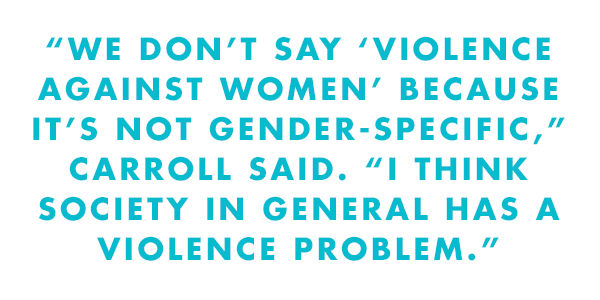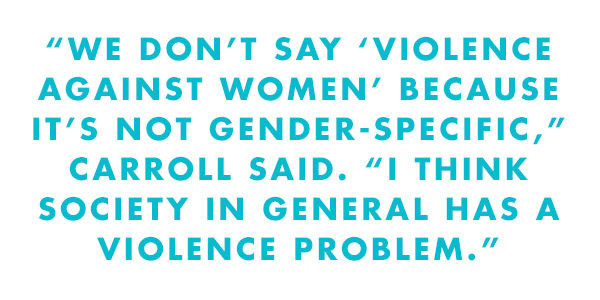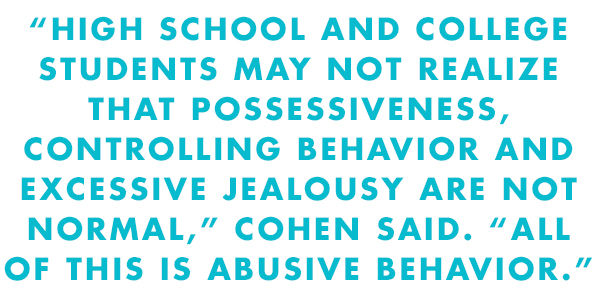The announcement this month of former Baltimore Ravens running back Ray Rice’s indefinite suspension sparked a dialogue around the country about domestic violence.
But it’s not just a leaked elevator video that has the public outraged — it’s the staggering statistics regarding domestic violence.
One in four women encounters domestic violence during her lifetime, and women who are 20 to 24 years old are most likely to fall victim, according to Safe Horizon, a victims’ services agency.
At this university, programs such as Campus Advocates Respond and Educate to Stop Violence provide assistance to domestic violence victims, educate the community and respond to incidents, according to the University Health Center website.
This university also has a broad sexual misconduct policy, which applies to all staff, students, faculty, guests and contractors, said Catherine Carroll, director of the Sexual Misconduct & Relationship Violence Office.
“We don’t say ‘violence against women’ because it’s not gender-specific,” Carroll said. “I think society in general has a violence problem, and I don’t think that this university is any different from the rest of the country.”
The only difference, Carroll said, is that the media gives more attention to violence issues because power structures make it a priority. But “it should be a priority no matter who’s in power,” she said.

Catherine Carroll
In the high-profile domestic violence case regarding Rice, the public guessed the outcome before the video was released. The Ravens organization initially defended Rice and his actions, and Ravens fans gave Rice a standing ovation at training camp and during a preseason game. The Ravens’ Twitter account also recently deleted a tweet that read, “Janay Rice says she deeply regrets the role that she played the night of the incident.”
“Without the video, people could explain the incident in their alternative narratives,” said Casey Corcoran, program director at Futures Without Violence, a non-profit organization that advocates against domestic and sexual violence. “With the video, there’s absolutely no doubt of what happened. When you see it, you can’t run away from the reality of it.”
Corcoran said fans who idolize celebrities “feel like they know them,” and thus won’t believe damaging details of stars’ personal lives.
“Since we feel like we know the person, we’ll say ‘Oh, they wouldn’t do that; they’re an upstanding citizen,’” Corcoran said. “But we really don’t know anything about them.”
As a society, people need to recognize how prevalent gender-based violence is to address it and put effective prevention programs in place, Corcoran said.
“It starts with talking to teens early,” she said. “It’s of course a sensitive and uncomfortable topic to talk about, but we need to have open discussions about domestic violence early.”
Knowing more about domestic violence, its cycle and reasons why victims stay in abusive relationships can help put an end to victim-blaming culture, said Michaele Cohen, executive director of the Maryland Network Against Domestic Violence (MNADV), this state’s coalition against domestic violence.

Michaele Cohen
“Knowing more about the dynamics of an abusive relationship and how difficult it is to leave an abusive situation is essential,” Cohen said.
Some people also might not be able to identify different forms of abuse, such as sexual and emotional, Cohen said — it can be more than just hitting.
“High school and college students may not realize that possessiveness, controlling behavior and excessive jealousy are not normal,” she said. “All of this is abusive behavior.”
But there is support on the campus regarding these issues, coming from student groups on the campus such as UMD Feminists.
“One of the most powerful things we do through offering support is letting survivors know they are not alone and we believe them,” said UMD Feminists President Jill Santos. “We’re here to provide support. We have a lot of people in the group who are here to talk.”
Santos, a senior criminology and criminal justice and psychology major, also said this university does a good job keeping students safe. She said she has been to the Title IX office, where the staff members “really know what they’re doing.”
Identifying the non-physical red flags is extremely important, because non-physical abuse may eventually escalate to physical abuse, Cohen said.
“We want people to recognize the earlier stages,” Cohen said. “These are always important things to be looking for.”





